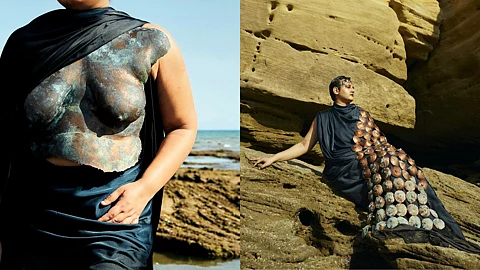
- HOMEGROWN WORLD
- #HGCREATORS
- #HGEXPLORE
- #HGVOICES
- #HGSHOP
- CAREERS
- ABOUT US
- CONTACT US

Exploring the themes of bodily autonomy, gender-based violence, moral policing, sexuality, and censorship in her work, Misha Japanwala rejects and deconstructs the external shame imposed on one's body which is rooted in her personal experience as a Pakistani woman. Aiming to create a new historical narrative and documentation of marginalized bodies that is characterized by honesty, resistance, and autonomy, her work challenges the historical objectification, commodification, and control exerted on women's bodies by patriarchal societies, offering a fresh perspective that empowers individuals to define their own terms of existence.
Her first solo exhibition 'Beghairati Ki Nishaani' (Traces of Shamelessness) showcased at the Hannah Traore Gallery, is a powerful is a visual record of artists, activists, and 'beghairats' from Misha's hometown of Karachi, Pakistan. In a reclamation of the word 'beghairat', the artist subverts the shame that's weaponized against women in order to control them. Creating moulds and casts of the body, the artist documents and preserves the stories of femme, queer, and trans lives, compiling an archive of resistance and resilience.
At the heart of the collection are breastplates that serve as symbols of history-making. Japanwala raises important questions about who controls the narrative of past lives and how artefacts from marginalized communities can be protected in the face of patriarchy. Against the backdrop of climate change and authoritarianism, the artist moulds these breastplates as a form of enduring armour; commemorating bodies in a truthful and inclusive manner.
In the series 'Hands of a Revolution', Misha pays tribute to individuals who redefine shamelessness and actively work towards liberation. Figures like Sharmeen Obaid Chinoy, a filmmaker advocating for marginalized people in Pakistan, and Dua Mangi, who faced public shaming for her clothes after a kidnapping incident but has since become a champion of women's rights, serve as muses for the artist. Misha moulds their hands, symbolizing action, autonomy, and solidarity.
Another noteworthy series in the exhibition involved inviting femmes from Karachi to participate anonymously by having their nipples moulded. These molds, representing a diverse range of ages and personal histories, were interconnected to create a chainmail-like structure. Each participant's unique story is intertwined within this form of artistic representation, whether it be a mastectomy survivor, a woman embracing newfound freedom after divorce, or a young trans woman forging a new relationship with her body.
Misha's exploration extends beyond the contemporary, delving into artifacts from the ancient Mohenjo-Daro and Harappa civilizations of the Indus Valley. These archives reveal depictions of diverse body types and identities, emphasizing the historically rich spectrum of human existence. By coating her plates with bronze, copper, and gold and applying chemicals for an aged effect, the artist envisions her work as future archaeological discoveries that unearth the collective memories of those who embraced agency, love, and possibility. Beghairati Ki Nishaani is an assertion for marginalized bodies to claim physical space and existence, free from the burden of societal judgment and immortalized in their own legacy.
Check out Misha's work here.
If you enjoyed reading this, here's more from Homegrown:
Riya Chandiramani's Cereal Boxes Depict The Interplay Of Gender, Patriarchy & Capitalism
Tarshaa Krishnaraj's 'Crumb Cud' Symbolically Depicts Human Gluttony & Excess
Pallavi Chattoraj Illustrates Discrimination Through The Allegory Of A Fish Market
